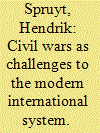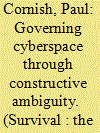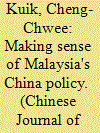|
|
|
Sort Order |
|
|
|
Items / Page
|
|
|
|
|
|
|
| Srl | Item |
| 1 |
ID:
126586


|
|
|
|
|
| Publication |
2013.
|
| Summary/Abstract |
Using the 'achievement index', a country's relative size of gross domestic product divided by its relative size of population, I argue that the high-achieving position of the West, as a structural distortion, has been a principal source of instability in the modern international system. Rather than being just unsatisfied great powers, large high achievers and stagnant low achievers engage in hegemonic and counter-hegemonic warfare, respectively. Both hierarchy and balancing systems are structurally more stable if they are 'natural' and less stable if they are 'unnatural', with being natural defined as an achievement index of 1. The rise of the rest constitutes a long-term trend back to nature, beginning to flatten the heretofore skewed international structure, which lessens one source of modern system-level instability. With a much larger share of world population, China cannot rise to the same relative height as the West that rose with a much smaller share of the population. China's rise is thus unlikely to repeat the past experience of the rising West.
|
|
|
|
|
|
|
|
|
|
|
|
|
|
|
|
| 2 |
ID:
155235


|
|
|
|
|
| Summary/Abstract |
The current international system is based on Westphalian principles in which authority is defined territorially. Within this territory, the state has sole jurisdiction. Adherence to these principles has contributed to the decline of interstate war. Conversely, applying these principles and correlated norms to states that gained their independence after 1945 has contributed to civil conflicts. These norms are opaque, as is the case with the principle of self-determination; or they lock in an unstable status quo, as with uti possidetis, the principle that borders inherited at the moment of independence should always be maintained; or they are inconsistently applied and often violated, as with the principle of noninterference. Consequently, they provide poor guidelines as to when, and on which grounds, external intervention in civil wars might be warranted. I argue that the degree to which the combatants challenge Westphalian principles should guide policy responses. Furthermore, the international legal regime should reconsider uti possidetis. In some instances, partition might be a reasonable solution to civil wars.
|
|
|
|
|
|
|
|
|
|
|
|
|
|
|
|
| 3 |
ID:
139039


|
|
|
|
|
| Summary/Abstract |
At its simplest, cyberspace is a global medium for communication and information exchange between computers and their human operators, an environment (of sorts) in which it is possible for digital signals to be sent, received and processed. Like other communications media, the operating
conceit of cyberspace is that it should be indifferent to the quality and meaning of the traffic it carries. It comes as no surprise, then, that cyberspace can be a vehicle for challenge, insecurity, instability, crime and competition. But it can just as often signify opportunity: commercial, economic, cultural, political, social and even moral, in terms of individual human fulfilment.
|
|
|
|
|
|
|
|
|
|
|
|
|
|
|
|
| 4 |
ID:
126587


|
|
|
|
|
| Publication |
2013.
|
| Summary/Abstract |
Using Malaysia's China policy as a case study of a smaller state's response to a rising power, this article challenges the mainstream neorealist notion that the growing capability and geographical proximity of a rising power tend to induce fear among its weaker neighbours. By tracing the transformation of Malaysia's China policy, the article's findings indicate that power asymmetry and geographical proximity have no inherent logic of their own; rather, whether and to what extent the two variables will prompt smaller states to become fearful and/or attracted to a rising power is often a function of intervening factors at the domestic level, i.e. the imperative of ruling elite's domestic legitimation. In the case of Malaysia's China policy, it is the ruling Barisan Nasional elite's desire to capitalize on the big power's rise-for the ultimate goal of enhancing and justifying its political authority at home-that has driven the smaller state to adopt a hedging approach characterized by an inclination to prioritize immediate economic and diplomatic benefits over potential security concerns, while simultaneously attempting to keep its strategic options open for as long as the systemic conditions allow.
|
|
|
|
|
|
|
|
|
|
|
|
|
|
|
|
|
|
|
|
|